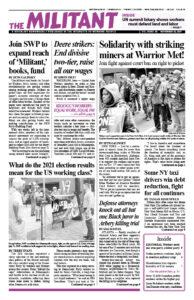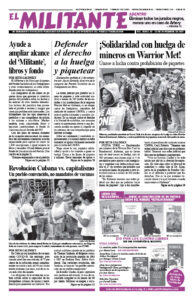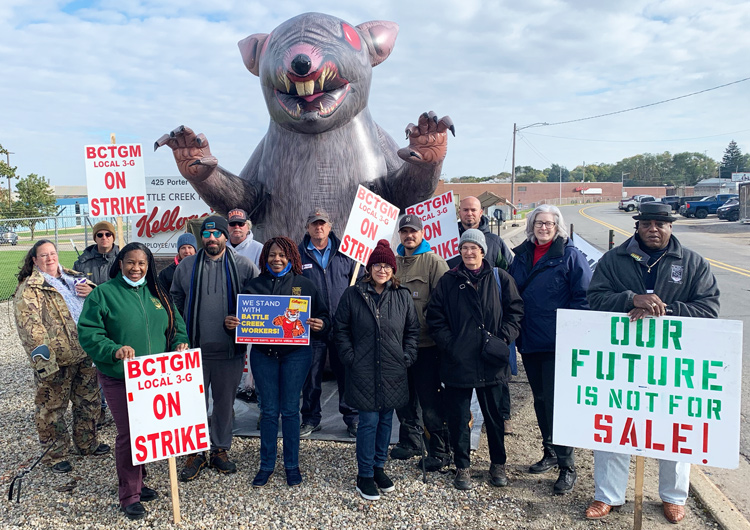BATTLE CREEK, Mich. — The Bakery, Confectionery, Tobacco Workers and Grain Millers International Union negotiating committee voted down a Nov. 4 “last, best and final” set of contract demands from Kellogg’s bosses. Since Oct. 5, 1,400 union members have been on strike at four plants — in Omaha, Nebraska; Memphis, Tennessee; Lancaster, Pennsylvania; and here.
The bosses’ offer “does not achieve what our members are asking for; a predictable pathway to fully vested, fully benefitted employment for all employees with no concessions,” the union said.
Many signs you see on the picket line say, “Equal pay for equal work.”
“The company won’t budge on the question of transitional employees and that’s our main issue,” Lisa Gregory, an international representative for BCTGM, told the Militant. The 2015 contract allowed Kellogg’s to keep 30% of the workforce in “transitional” status, a second tier making as much as $12 an hour less than “legacy” employees. They get no pension and pay much higher medical premiums and deductibles.
“The company is supposed to ‘transition’ them into legacy status when someone retires or leaves, and they’re not doing it,” she said. “Now they want to get rid of the 30% cap on the number of transitional employees in a plant. We want to get rid of the two tier altogether.”
Robert Clark, a maintenance worker with 15 years on the job, said that despite what the bosses say, their latest offer was just “part of negotiations. There’s no legal standing to it. It means we have to stay out a bit longer.” There are some 320 union members at the plant here.
Clark said the company is trying to “keep up the illusion” that they are producing with replacement workers. But, he pointed out, the strikers could tell they aren’t because they can’t hear blowers that go on when raw materials are being moved to production. The company puts out misleading information about hours and pay claiming “we make $120,000 a year,” he said. “We have to work every day to make that much .”
Many workers are working every day, John NeSmith said. “We work seven and sometimes eight days a week, because they add another shift on. This year I had a stretch where I worked 152 days in a row without a day off.”
Ricky Miller, who was picketing by the railroad tracks, said that since the strike began only one train has entered the plant. He started as a “casual” worker 15 years ago, and it took him seven years to become a permanent employee and make top wages and benefits. “At least you had a way to get there,” he said. “We’re fighting for the future workers.”
Support coming in
The mood on the picket line and in the union hall was upbeat and optimistic. The strikers have been getting a lot of support. While we were there workers dropped off a truckload of firewood, brought pizzas, and a retired Kellogg’s worker and his wife drove out from Niles, Michigan, to pick up signs to put in their yard. We met Bill Dearing, a retired carpenter who regularly pickets, and four BCTGM Local 1 officials, who drove from Chicago to show support.
On Nov. 4 Kellogg’s bosses released their third-quarter report with profits up by almost 20% from the same quarter last year. “Kellogg’s continues to threaten to put profit over people and BCTGM Local 3G members will not stand for it,” responded Trevor Bidelman, the local’s president. “Our members are the ones who put their lives on the line through the pandemic to ensure that Kellogg’s products made it to grocery stores across the country and our strike will continue until we reach a fair contract.”
A GoFundMe page has been set up by Theodore Hunt, president of Retail, Wholesale, and Department Store Union Local 374, which organizes the Post cereal factory down the road. As of Nov. 7, over $68,000 has been raised for BCTGM Local 3G. A church group brings hot dinner to the union hall twice a week. The hall is filled with pantry contributions. An email sent out by the Michigan AFL-CIO asks for donations of household goods and other supplies.
Donations can be made out to “BCTGM Local 3G CES Fund” and sent to the hall at 1006 N. Raymond Road, Battle Creek, MI 49014.
The Michigan AFL-CIO organized a rally in front of Kellogg’s world headquarters in Battle Creek Oct. 27. Supporters came from the United Auto Workers, the Building and Construction Trades Council and other unions. There are plans in the works to organize another solidarity action here.


